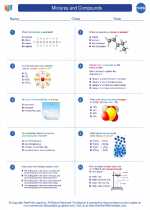Assimilation in Chemistry
Assimilation is an important concept in chemistry, especially in the context of biological processes and environmental chemistry. In simple terms, assimilation refers to the process by which organisms incorporate nutrients and other substances into their cells, tissues, and organs. This process is crucial for the growth, development, and maintenance of living organisms.
Assimilation of Nutrients
In the context of biological systems, assimilation primarily involves the uptake and utilization of essential nutrients such as carbon, nitrogen, phosphorus, and other elements required for the synthesis of biomolecules. For example, plants assimilate carbon dioxide from the atmosphere during photosynthesis to produce carbohydrates, which serve as a source of energy and building blocks for growth. Similarly, nitrogen assimilation involves the uptake of nitrate or ammonium ions from the soil and their conversion into amino acids, proteins, and other nitrogen-containing compounds.
Environmental Chemistry
Assimilation is also relevant in the field of environmental chemistry, particularly in the study of nutrient cycles and pollutant dynamics. For instance, the assimilation of pollutants by living organisms can affect their bioaccumulation and biomagnification in food chains, with potential implications for ecological health and human exposure to contaminants.
Study Guide for Assimilation in Chemistry
- Understand the concept of assimilation in biological systems, including the role of enzymes and metabolic pathways in nutrient assimilation.
- Explore the processes of carbon assimilation in photosynthetic organisms and the conversion of inorganic carbon into organic compounds.
- Examine the mechanisms of nitrogen assimilation in plants and microorganisms, focusing on the uptake, assimilation, and utilization of nitrogenous compounds.
- Investigate the role of assimilation in the biogeochemical cycles of elements such as carbon, nitrogen, and phosphorus, and their implications for ecosystem dynamics.
- Discuss the significance of assimilation in the context of environmental chemistry, including the assimilation of pollutants by organisms and the potential consequences for environmental and human health.
By mastering the concept of assimilation in chemistry, you will gain a deeper understanding of the intricate processes that sustain life and shape the behavior of chemical substances in natural systems.
.◂Chemistry Worksheets and Study Guides High School. Mixtures and Compounds

 Worksheet/Answer key
Worksheet/Answer key
 Worksheet/Answer key
Worksheet/Answer key
